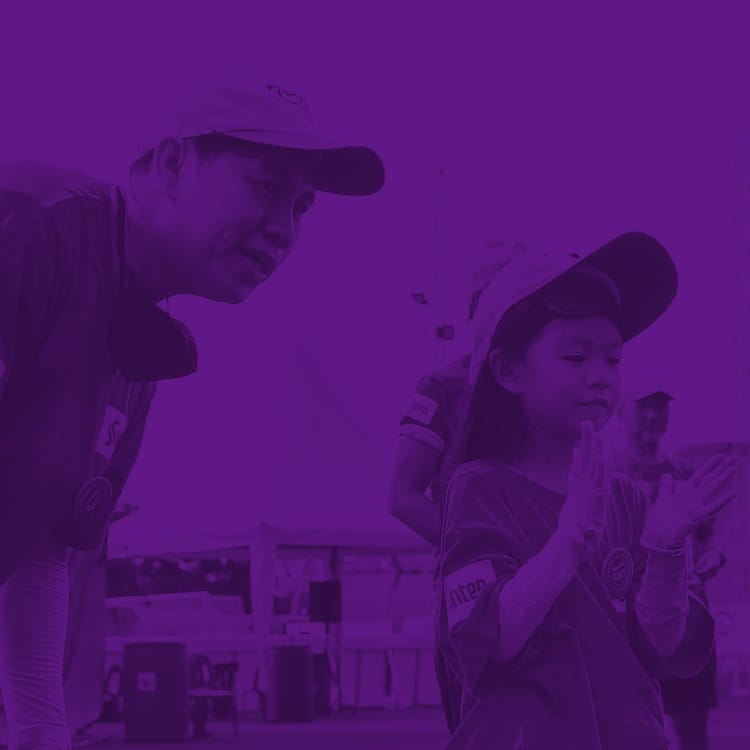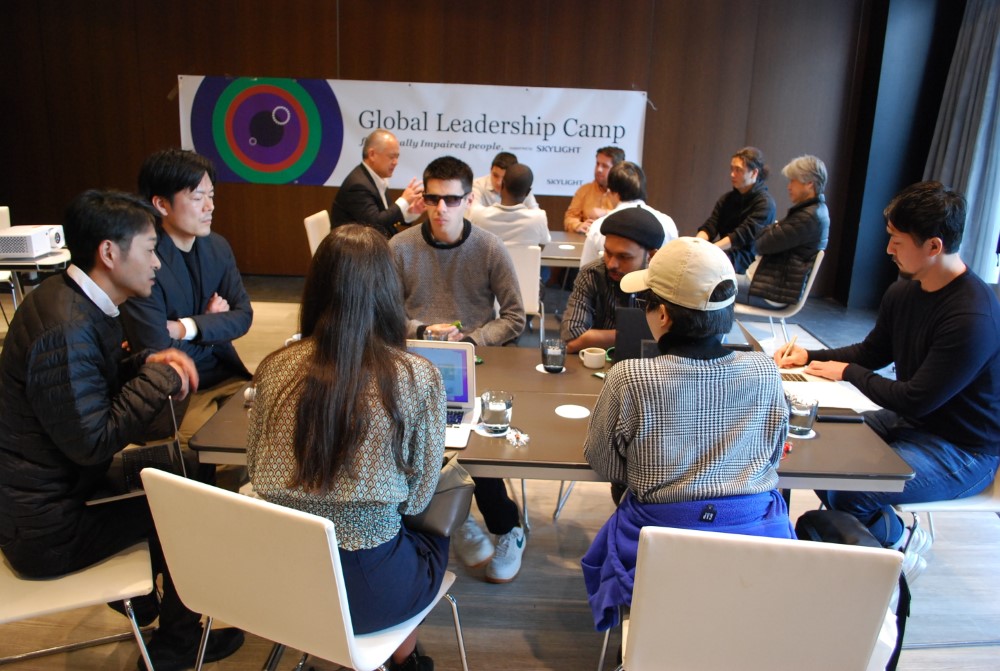
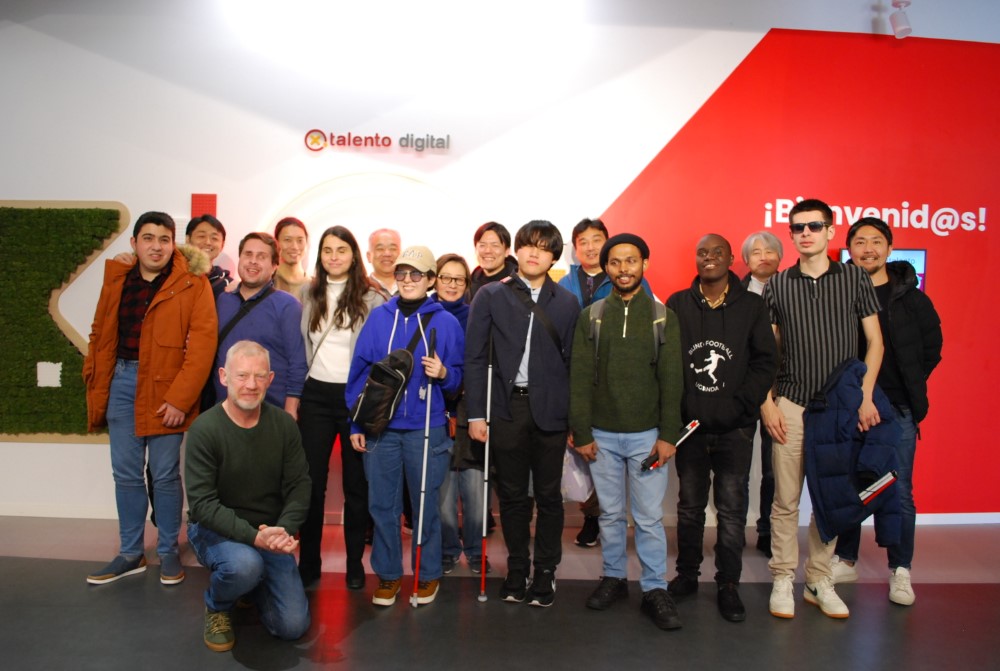
【Why we hosted the camp 】
Our goal is “to identify and foster future leaders among the visually impaired in order to improve and change the social environment for visually impaired people in each country.”
Social issues related to the visually impaired exist widely in each country and region, and while some are common to all countries, many others are different. We believe that local human resources are indispensable to for solve these issues.
The Global Leadership Camp(GLC)aims to identify local visually impaired leaders and improve their leadership skills. This is our first attempt.
【Outline】
Host city: Madrid, Spain.
Dates: March 10-15, 2024.
Number of camp participants: 8 visually impaired people from different countries.
Number of observers: 4 from 3 companies (Recruit, knots associates, Ashirase).
Sponsor: Skylight Consulting, Inc.
Local partner: Spanish National Organisation of the Blind (Organización Nacional de Ciegos Españoles – ONCE-
【Selection of Participants】
The GLC covered all the participants’ travel and other expenses (hotel, meals, etc.) during the camp. Applicants were required to be able to read, discuss and present in English, have basic PC skills such as Microsoft Office software, and come alone to the airport in the host city.
IBF Foundation has established ties with sports organizations for the visually impaired around the world through its support for blind football tournaments, provision of equipment, and grants. Through this network, we sent out application requirements.
Applicants were asked to submit documents describing their ideas on how they would like to acquire leadership skills, what they would like to accomplish in the future, and what kind of projects they would like to implement. After screening all the applications and holding online interviews, 8 participants were selected.
【Participants】
The eight participants came from India, Japan, Uganda, Argentina, France, and Spain. Six were men and two were women, ranging in age from 19 to 35. Backgrounds tended to be involvement in local visually impaired communities/organizations or researching and working on information accessibility and inclusion.
On March 10, the day of the first meeting, the six participants from outside Spain arrived alone at Madrid international airport. Because they were visually impaired and had arranged in advance with the airlines to assist them from the departure airport to the gate of the Madrid airport, the participants were able to move with support from airport staff and others.
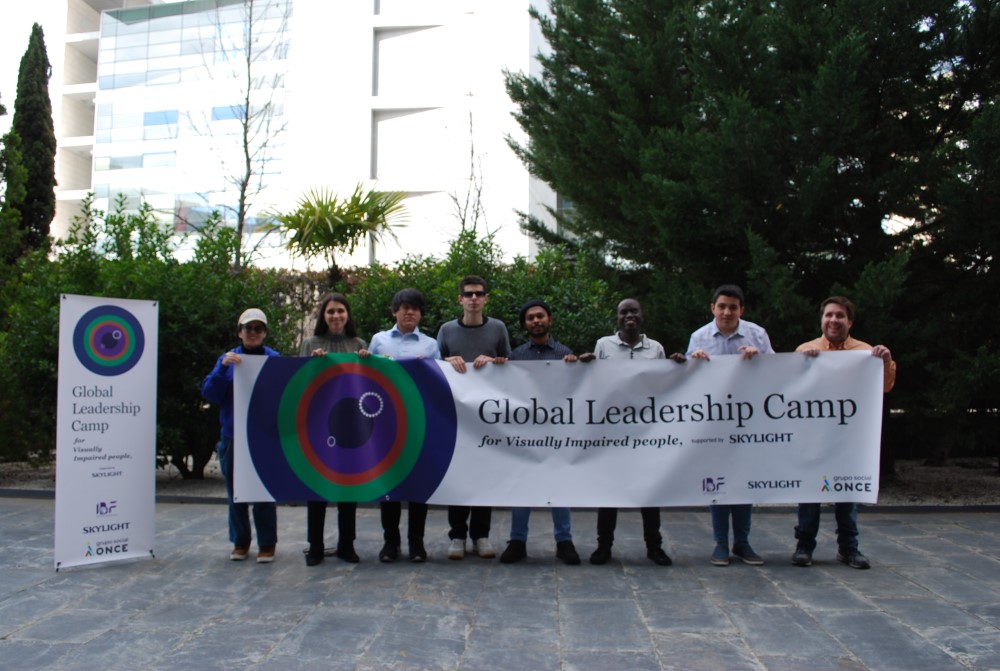
【ONCE and the venue】
The cooperation of the Spanish National Organisation of the Blind (ONCE – Organización Nacional de Ciegos Españoles) was crucial to ensure the quality of the camp.
ONCE is licensed to sell lottery tickets in Spain, creating jobs for visually impaired people and people with other disabilities as sales representatives, etc., and its group companies, including hotels and food companies, employ thousands of people with disabilities and provide inclusive services. ONCE Social Group is the fourth largest Spanish employee, providing jobs to almost 70 000 people, of whom over 60% have a disability.
The camp took place at the Ilunion Atrium Hotel, owned by the ONCE Social Group. The hotel is a comfortable place for both people with and without disabilities, and the lines and layout make it easy for visually impaired people to walk around on their own. All staff are trained in assisting people with disabilities, and some participants were able to move around the hotel as they wished with the assistance of hotel staff.
【Program Structure】
At the application stage, participants submitted an essay as a preliminary assignment on the project they aim to realize in three years. Through each lecture and experience during the camp, they brushed up on the project they wanted to accomplish and what they wanted to achieve, and gave a presentation on the final day.
The program was designed to teach both theory and practice: what are the outcomes of the project or what we want to accomplish, who are the stakeholders and what kind of people/organizations are involved, what kind of value exchange is involved, and so on.
The program was designed to nurture the four qualities that visually impaired people need to become leaders: leadership, challenging sprit , the ability to set goals, and experience in achieving results with a team.
【Observers and mentors from Japan】
Four representatives from three Japanese companies attended the camp to observe the program. The input they provided in their presentations and workshops also helped participants develop their leadership skills. They also served as mentors to the participants in finetuning their projects and presentations. The observers also gained a lot of insight and motivation about their own projects as they communicated with the participants every day.
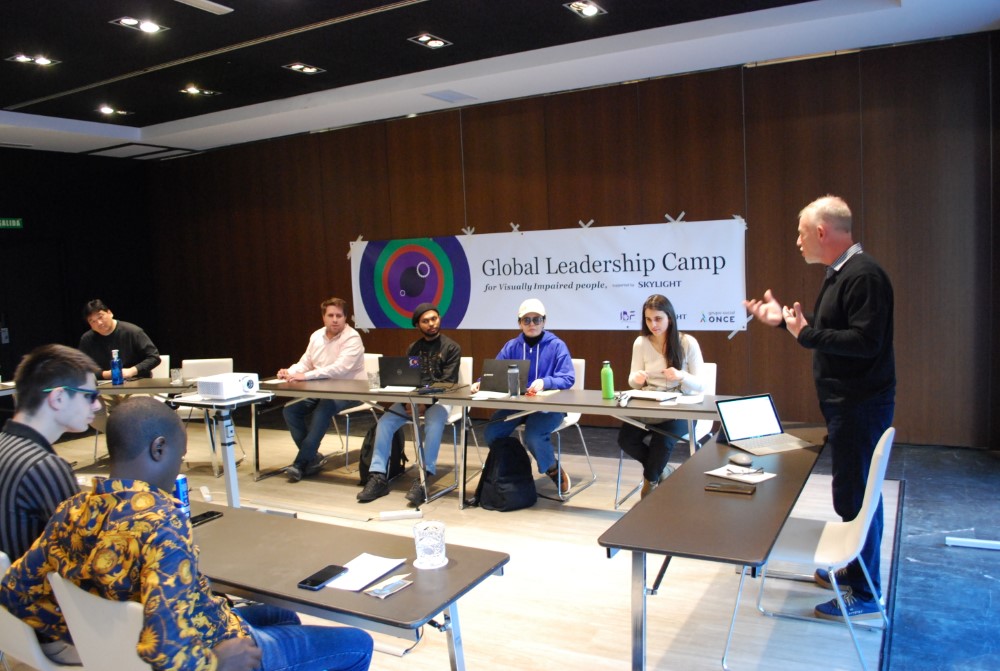
【Day 1】
Introduction.
Educational session focusing on leadership and thought analysis.
Participants rethink their individual project goals for the next three years based on the three elements of outcomes (objectives), outputs (results), and actions (behaviors).
Inspirational talk by David Casinos, Paralympic gold medalist in the shot put and discus (visually impaired class) on the theme “The sun comes out every day”.
Participants have a chance to test Ashirase products and provide feedback based on their own situations and backgrounds.
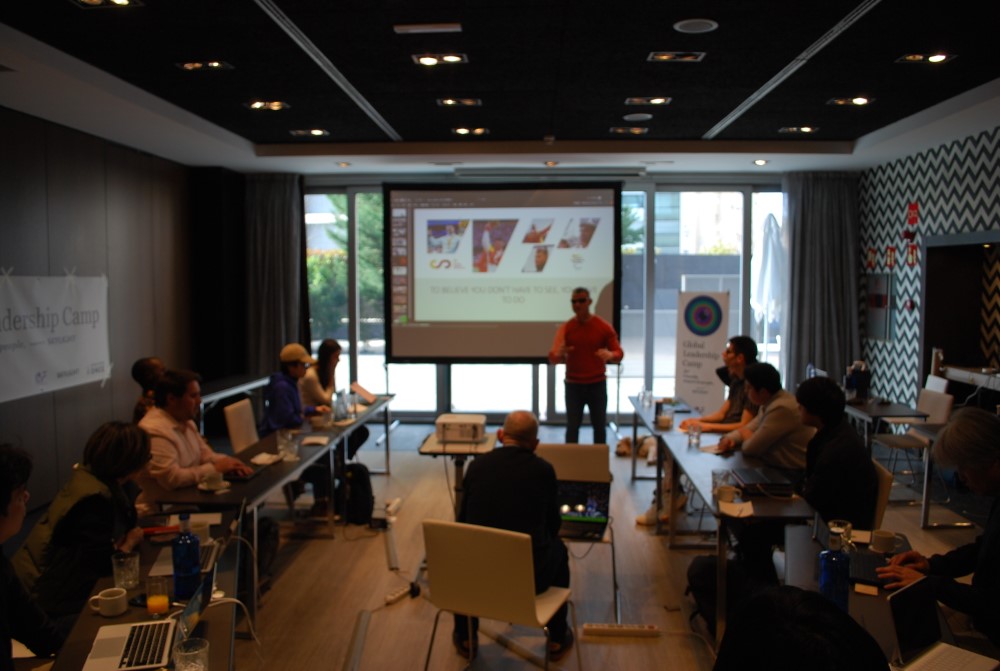
【Day 2】
Participants and observers teamed up to explore the city of Madrid. Adaptation to an unknown environment.
They visited a cutting-edge training centre run by ONCE Foundation which offers programs and courses specialized in digital technologies and technology-related professions for people with disabilities.
They visited a community soccer club “Dragones de Lavapiés” in Madrid Lavapiés area. The local club, founded and managed by a visually impaired person, provides sports opportunities not only to people with a disability, but also to the local community at large. They listened to a speech by representatives of the club.
A workshop was held to experience the team-building process using a blind football ball. Observers also participated in the workshop, and both sighted and visually impaired participants worked together to improve their team skills.
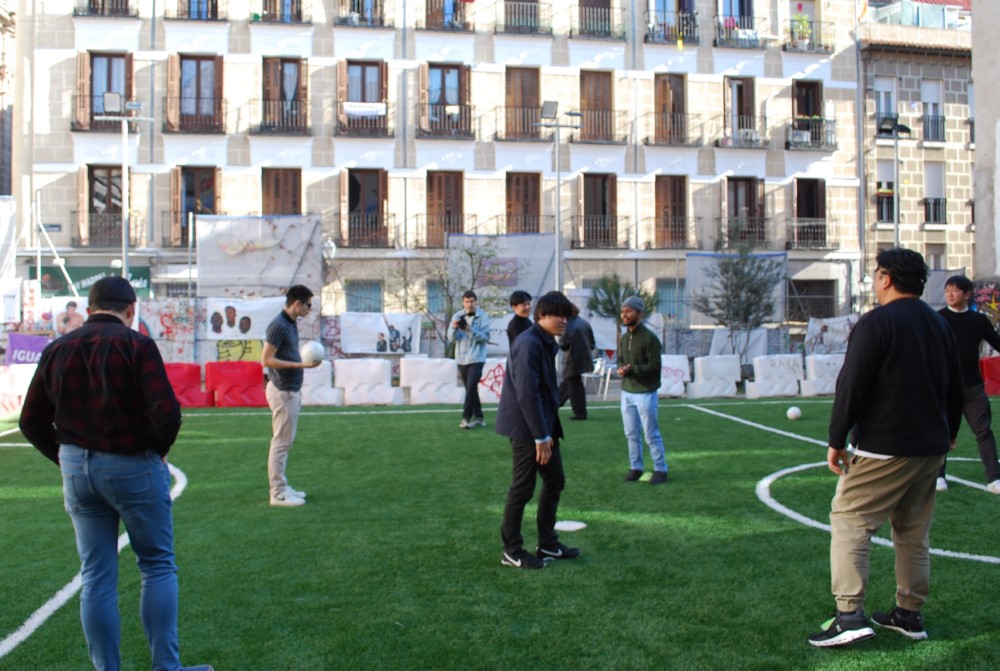
【Day3】
Mr. Fukuda of Recruit Co., Ltd. gave a presentation on “Effective team dynamics” and Ms. Watanabe of knots associates offered a presentation on “System thinking”. Based on the given inputs, participants developed specific outcomes, outputs, and action plans for their own projects and problem-solving efforts towards their individual three-year goals.
José Soares, founder & chief executive of Integrated Dreams, a Portuguese NGO, gave an inspirational talk titled “Leading the way in Football for All”. The non-profit organization aims to overcome barriers faced by people with disabilities in the sports industry, and José provided concrete advice in response to questions from participants.
Participants reported on the progress of their individual projects in preparation for the final presentations.
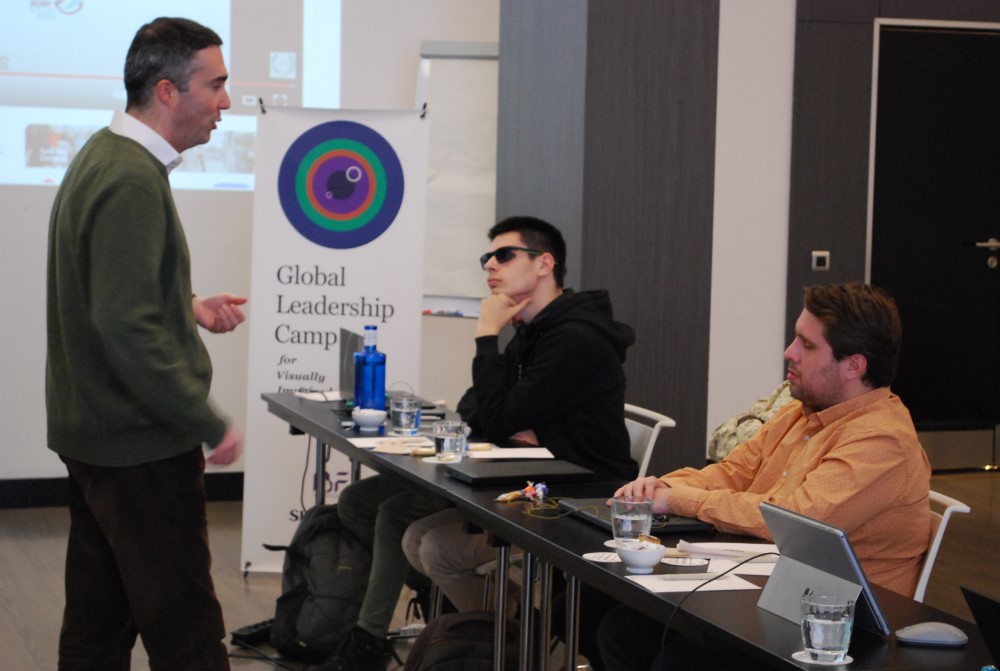
【Day4】
Participants and observers visited the museum operated by ONCE. They were able to touch documents and literature on the history of the visually impaired, art works created by visually impaired people, and models of important architectural structures and monuments in Spain and abroad.
Mr. Ishii of Ashirase gave a presentation on the background of product development and business strategy. Mr. Habutsu of Skylight Consulting presented future plans for investment in para sports and innovation hubs for people with a visual impairment. Participants reflected on how their own projects could create value and exchange with companies.
Participants worked on their projects in preparation for the final presentation.
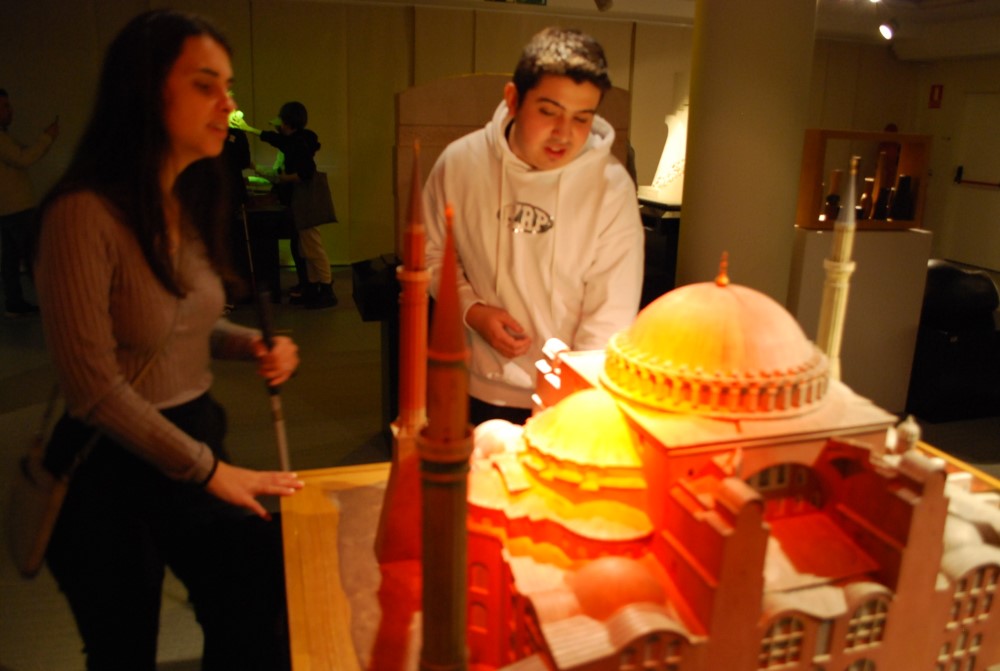
【Day 5】
Each of the 8 participants gave a 5-minute presentation and led a 3-minute Q&A session on the project they aim to deliver in the next 3 years. Presentations focused on planned outcomes, outputs, and actions (and inputs) based on a logic model, integrating the “Skills & Knowledge,” “Experiential Work,” and “Inspirational Talks” elements learned throughout the camp program. Specific feedback was provided on both presentation techniques and content, as well as advice on implementation.
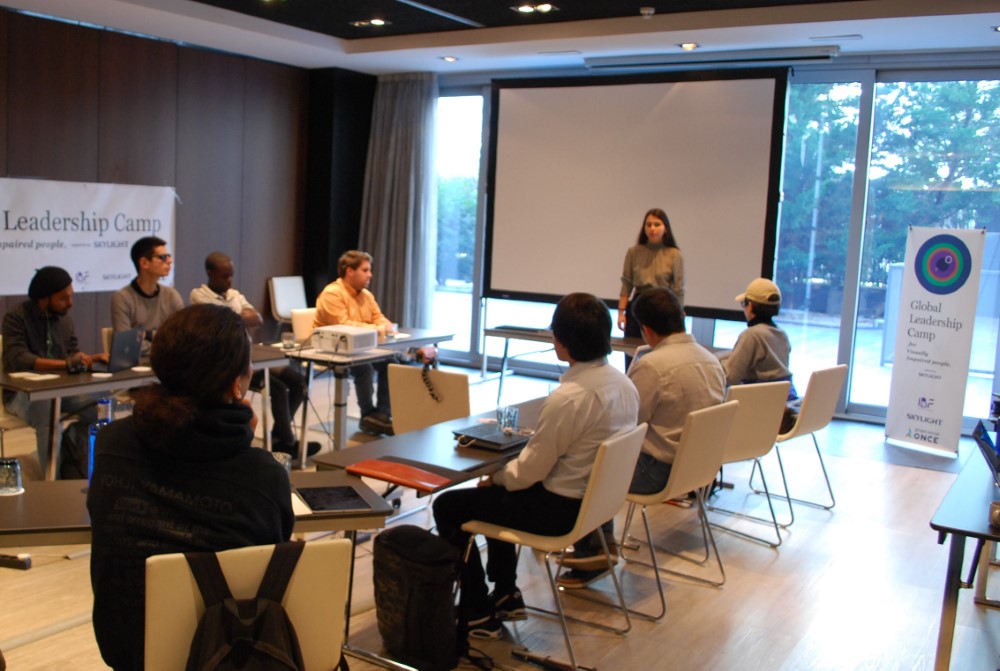
【Themes of the participants’ presentations】
A) Promoting social inclusion and peer support.
B) Eliminating the education gap among people with a visual impairment between rural and urban areas to create a society in which the visually impaired can play an active role in a wider range of fields.
C) Improving access to blind football and raising awareness of the cultural activities of visually impaired people in the areas where they work.
D) Contributing as an interpreter in organisations and companies that support visually impaired people.
E) Ⅰ Improving the physical and mental wellbeing of visually impaired children in Spain attending general schools and their families.
Ⅱ Providing role models for visually impaired children, showing them how to build independent and fulfilling lives as visually impaired people.
Ⅲ Encourage leadership by visually impaired people.
F) Ⅰ Spread knowledge and awareness among visually impaired people of assistive devices and how to use it over the next three years.
Ⅱ Establish eight women’s blind football teams that can compete in regional, national and international tournaments and organise women’s competitions.
G) Ⅰ To enable visually impaired children to learn essential swimming skills to save their own lives and protect themselves from disasters such as flooding.
Ⅱ To eliminate social prejudice against people with a visual impairment through sport and to build a positive society for those affected.
H) Promoting the inclusion of persons with disabilities in the fields of sport, infrastructure, self-sufficiency and public services.

【Participant comments】
On average, participants rated all items in the survey at 4 or higher out of 5. The net promoter score (NPS) rating was 100 (all recommended). Participants gave particularly high marks to the networking they gained at the camp (4.7) and to the experience of working as a team to produce results (4.55).
“I learned communication skills as a leader, systems thinking, and other professional things.”
“I learned what kind of leader I should be, how to inspire, and how to integrate sports into my business.”
“The camp has given me a lot of confidence in myself.”
“I believe that in the future we will be able to cooperate on many issues and support each other. That was the most important thing for me this time.”
【Observer’s comment】
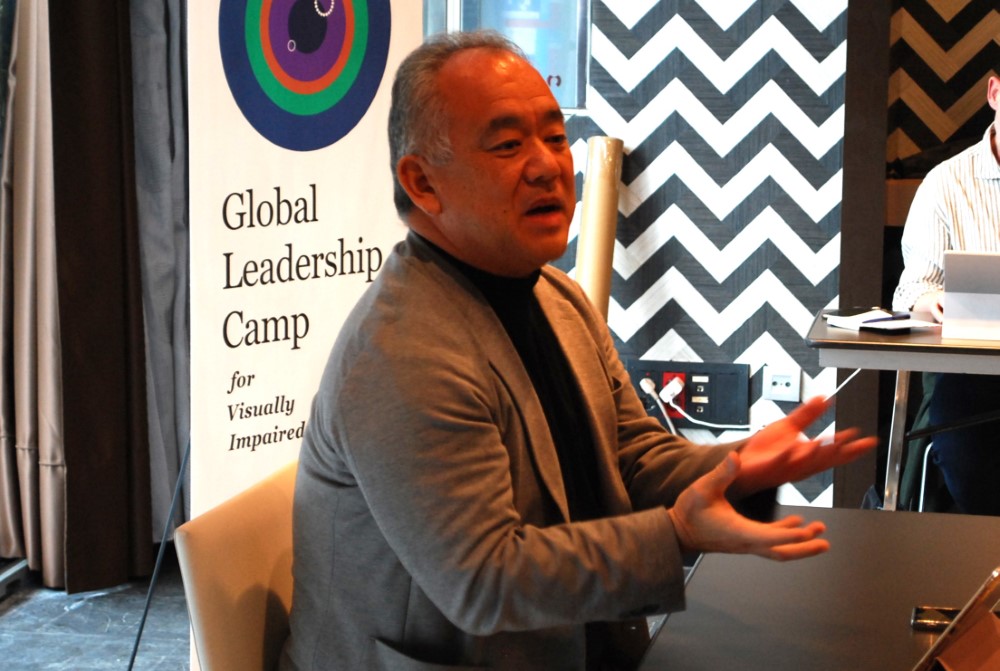
Mr. Toshiki Habutsu, President of Skylight Consulting Inc.
“Most of the people who participated as observers this time do not have a lot of contact with people with disabilities, and I think the fact that they supported people with disabilities, or that people with disabilities expressed their thoughts on their own, was probably an insight in itself. There are many different types of people with disabilities, and by seeing them come out in different ways during the work, I think the observers were able to realise that there are many different types of people with disabilities, so there are many different types of support and many different possibilities.”
Ms. Kyoko Watanabe, Director/COO, knots associates Co.
“Spending time with blind people was a very impactful experience for me. It completely overturned my understanding of the concept of diversity and inclusion.”
Mr. Takayuki Ishii, Executive Officer/COO, Ashirase Inc.
“Our key insight came when participants tried our service. We saw that we could effectively address the challenges faced by these individuals from various countries. As a Japanese startup with a primarily Japanese customer base, receiving equally positive feedback from this global group was eye-opening. It demonstrated the value of this international opportunity and showed us our potential for broader impact.”
Mr. Takeshi Fukuda, HITOLAB, Recruit Co.
“Vision is something they cannot take away, so I learned how to put it into impressive phrases. To communicate to people who cannot see at all, I had to be really sincere and speak at length in words about why these things are necessary, how this relates to each other, and how using these things can help them think this way.”

